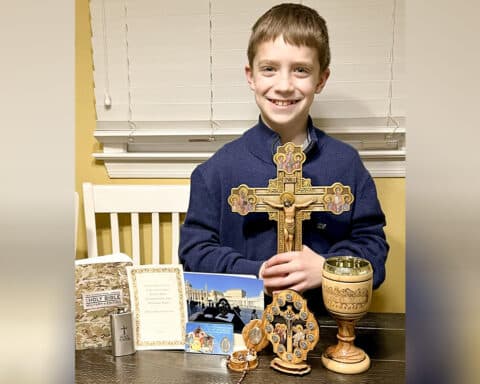
But Christmas music comes in a minor key, as well. The sad songs of Christmas (we’d hardly call them carols), if we listen carefully, might be more salutary in some ways than the joyous carols. A consistent message runs through some of these songs that might bear a more authentic Christmas message than “We Wish You a Merry Christmas.”
Take, for example, one of the most beloved of Christmas songs, Kim Gannon and Walter Kim’s “I’ll Be Home for Christmas,” in which the singer will not be home for Christmas. First recorded by Bing Crosby in 1943, the song is written from the perspective of an overseas World War II soldier, airman or sailor. Not only will he not be home for this Christmas, he knows that the risk is substantial that he won’t be home for any more Christmases. But he requests those things that signify the hope and joy of Christmas. And in these, the singer finds solace and comfort. He is grateful for the memories that evoke the images, even though he knows he may never see them again.
The loneliness of “I’ll be Home for Christmas” is a common reprise in the sad songs of Christmas. Sammy Cahn and David Holt’s 1953 song, “The Christmas Blues” (originally recorded by Jo Stafford and more recently by Bob Dylan), begins with a stark juxtaposition of the joyful symbols of Christmas with the singer’s isolation from people from whom gifts will come or to whom he can give them. He has done his window shopping at every merry display, but he has not stopped to buy a single gift. “What’s the use of stopping / When there’s no one on your list,” he laments. “You know the way I’m feeling / when you love and lose.”
The same theme, from the perspective of children, is reflected in Merle Haggard’s “Daddy Won’t be Home Again for Christmas” and Dwight Yoakam’s “Santa Can’t Stay.” We don’t know why Haggard’s narrator won’t be home, but we can presume that his absence is not wholly voluntary. Whether incarcerated or otherwise restrained by legal process (as many of Haggard’s characters are), the only thing he can send his child is a “little check.” He isn’t even able to purchase a gift. And “Santa” in Yoakam’s song is the divorced father whose former wife does not want him to have any contact with his children, even at Christmas and even disguised as Santa Claus. But Santa/Dad is no angel himself. “Doug, you’re drunk / Don’t come inside,” Mom says. And Santa multiplies the sadness for the children by throwing a present “that almost hit Mom’s new boyfriend, Ray.”
And what sadder songs are there in the entire Christmas oeuvre (broadly speaking) than The Pogues’ “Fairytale of New York” (written by Jem Finer and Shane MacGowan, and recorded with Kirsty MacColl) and Tom Waits’ “Silent Night/Christmas Card from a Hooker in Minneapolis”? “It was Christmas Eve babe / In the drunk tank / An old man said to me, ‘won’t see another one,'” begins the Pogues’ song. It then proceeds to a tumultuous, bawdy dialogue between the drunk and his erstwhile addict-lover, for whom dreams of happiness have long since disappeared in a fog of alcohol and drugs.
Similarly, Waits’ song is sung by a pregnant prostitute who (when she’s not in jail) lives alone above a porn shop. The song is in the form of a Christmas card to Charlie, the absent, presumptive father of the unborn child. “Everyone I used to know / Is either dead or in prison / So, I came back to Minneapolis” to turn tricks. But she was arrested and convicted. She wishes she had the money that she and Charlie had spent on dope, but she’s broke, in jail and cannot pay her lawyer. So, she wistfully hopes Charlie can loan her the money. “Charlie, hey,” the song ends, “I’ll be eligible for parole come Valentine’s Day.”

Two clear lessons emerge from these anti-carols. The first is the more common one that the aloneness of lonely people is inversely proportionate to the joy of Christmas for most (or maybe just some?) of us. Isolation and destitution are multiplied for people who cannot share in the comradery and abundance of Christmas revelry. Nobody wants to be a drunk, a prostitute, a damaged lover or an estranged parent. These people have a claim upon us, without regard to the cause of their dire straits.
The second lesson from these songs is that none of us have anything that is not a gift. No matter how much sweat and toil we may have put into building our lives of comfort, not one of us would have our relative material comfort without happy circumstances that we did not cause and for which we cannot take credit. Of course, this is most acute when we drill down to the essence of Christmas: All is grace, and therefore all should be gratitude. The anti-songs of the season tell us that every one of us is a sinner in need of grace, and not one of us deserves the coming of the Christ who brings it.
Kenneth Craycraft is the James J. Gardner Family Chair in Moral Theology at Mount St. Mary’s Seminary and School of Theology in Cincinnati. Follow him on Twitter @krcraycraft and on Instagram @ken.craycraft.





